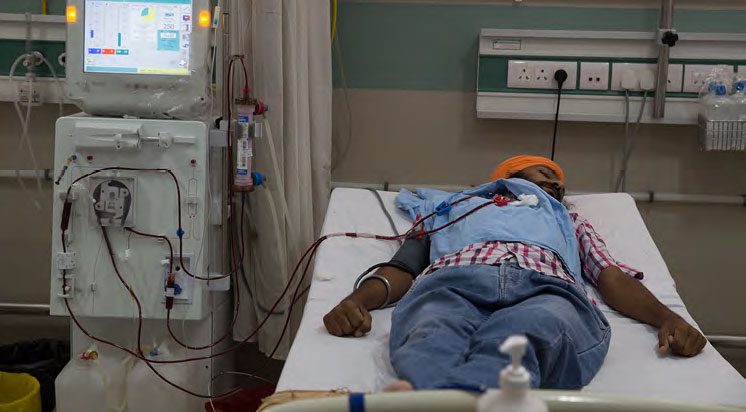
Dialysis outcome in India
Background
End stage kidney disease (ESKD) occurs when kidney function has deteriorated to the point that dialysis or a kidney transplant is required to stay alive. Research undertaken by the George Institute published in the Lancet in March 2015 shows that the burden of ESKD around the world is growing, and that most of the expected increase will be in low and middle income countries.
Dialysis is a safe and effective treatment for ESKD, but it is expensive, well beyond the means of the average patient and their families. For this reason, in wealthy countries the cost of dialysis treatment is borne by the health care system. In India there is no national system for paying for dialysis, and in many cases patients and their families must bear the cost themselves.
Many countries maintain a national registry of the treatment of ESKD so that clinical outcomes can be measured, improvements over time tracked, and benchmarking across services in different regions and countries can be undertaken. The ANZDATA Registry (hyperlink: www.anzdata.org.au), for example, has a complete set of results on ESKD patients cared for in Australia and New Zealand since the mid 1960s
Up until now, India has never measured the outcomes of treatment of ESKD in this systematic way. Researchers from the George Institutes offices in Sydney and New Delhi teamed up to make a start on the challenge. Because ability to pay has a significant impact on survival when there is no national payer, the team decided to collect economic outcomes as well as health outcomes.
Aims
- To collect data on health outcomes on patients with ESKD commencing dialysis in India
- To measure the economic impact of dialysis on patients and their families.
Progress
The first project was a modest pilot study in 2015 of just 100 patients in two centres – one public and one private – to demonstrate the feasibility of the use of low cost on line data capture tools and local staff to collect outcome data on patients on dialysis. A detailed protocol for the study was published (link to ref 2) and the results were presented at the Asia Pacific Congress of Nephrology and the American Society of Nephrology in 2016 (link to abstracts). A paper is in preparation.
A follow up study of 1000 patients in a dozen centres across India is now in progress, with results expected in 2018.
Members of the research team based in India are working with the Indian government and selected state health services to standardise the data collection systems which have been developed so that they can be used across the country.
There is interest from national kidney care providers in Africa, Asia and South America in using the simple on line methodology developed by this team to capture outcomes of ESKD treatment in those parts of the world. The timing is right for this international research program as many low and middle income countries around the world begin to tackle the challenge of providing a national ESKD treatment service for their citizens as part of the Universal Health Coverage targets of the United Nations Sustainable Development Goals.
References
- Liyanage T, Ninomiya T, Jha V, Neal B, Patrice HM, Okpechi I, Zhao M, Lv J, Garg AX, Knight JF, Rodgers A, Gallagher M, Kotwal S, Cass A, Perkovic V. Global access to treatment for end stage kidney disease. Lancet 2015. Published Online March 13, 2015.
- Jha V, John O, Joshi R, Kotwal S, Essue B, Jan S, Gallagher, M, Knight J. Dialysis outcomes in India: a pilot study. Nephrology 2015, 20, 329-334
- Vivekanand Jha, Oommen John, Abhinav Bassi, Sradha Kotwal, Rohina Joshi, Beverley Essue, Stephen Jan, Martin Gallagher, Ajay Kher, Raja Ramachandran, John Knight. Dialysis outcomes in India: Preliminary results from a prospective cohort study. Asia Pacific Congress of Nephrology and Australia New Zealand Society of Nephrology Annual Scientific Meeting, Perth, 17-21st September 2016
- Vivekanand Jha, Oommen John, Sradha Kotwal, Martin P. Gallagher, John Knight. The challenges of achieving universal health coverage for chronic conditions in low income settings: a case study of dialysis outcomes in India. American Society of Nephrology Chicago 15-20 Nov 2016. JASN 2016, 27, Abstract Edition, 342A










